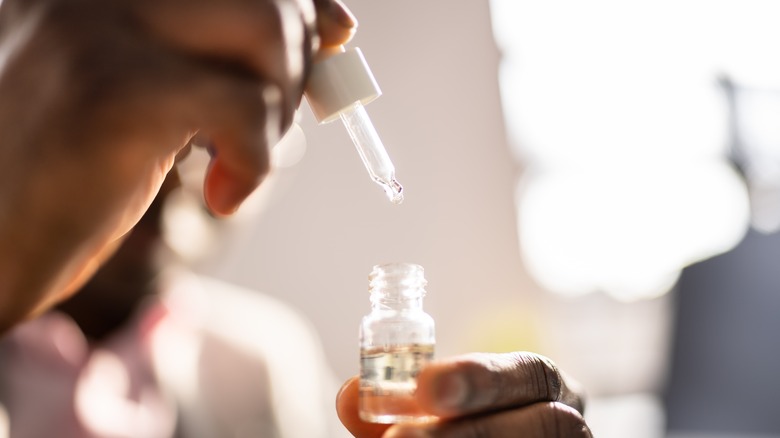How CBD Can Help Relieve Symptoms Of Parkinson's Disease
Parkinson's disease affects millions of people worldwide, causing a gradual loss of motor function. Its symptoms may include tremors, involuntary muscle contractions, difficulty speaking, mental decline, and poor balance. These problems often get worse over time and can lead to disability, notes the World Health Organization. Unfortunately, there's no cure for Parkinson's disease. Levodopa and carbidopa are a combination of drugs that may ease its symptoms, but can be expensive and hard to get depending on where you live.
Most medications prescribed for this movement disorder work by increasing dopamine levels in the brain. Some may help improve motor function, while others block certain enzymes that affect dopamine metabolism, explains Harvard Medical School. These drugs may reduce tremors and other symptoms, but it takes time to find the right option with the fewest side effects. An alternative is to use cannabidiol (CBD), a naturally occurring compound in the hemp plant.
CBD and Parkinson's disease: Know what to expect
Clinical evidence published in the Journal of Cannabis Research suggests that CBD may help alleviate pain and other common health complaints. What's more, it could benefit those with non-motor symptoms of Parkinson's disease, such as anxiety, depression, and insomnia, but further studies are needed to confirm it. CBD also appears to be safe and has fewer side effects than most medicines. Although it's not a cure for Parkinson's, it could improve your quality of life.
Most people with Parkinson's disease take symptom-specific medications, according to the Blue Cross Blue Shield Association. However, fewer than 60% of those aged 30 to 44 years comply with the treatment largely because of its side effects. Cannabidiol, on the other hand, is well-tolerated and has a good safety profile, reports a 2020 study featured in the journal Cannabis and Cannabinoid Research. While it's true that higher doses may cause digestive distress, nausea, headaches, and other adverse reactions, low to moderate doses appear to be safe.
CBD can stimulate dopamine production
As the scientists note in the 2020 study, CBD boosts antioxidant, anti-inflammatory, and neuroprotective effects. It also stimulates dopamine production in the brain, which may benefit those with Parkinson's disease. Other studies found that CBD may decrease psychotic symptoms, improve sleep quality, and boost mental well-being, suggests a 2020 review published in the Brazilian Journal of Psychiatry. Moreover, this compound may reduce the frequency of nightmares, vivid dreams, and other symptoms of rapid eye movement (REM) sleep behavior disorder, a condition associated with Parkinson's disease, according to a 2014 study featured in the Journal of Clinical Pharmacy and Therapeutics.
Cannabidiol could also reduce anxiety and tremors in people with Parkinson's, reports a 2020 study presented in the Journal of Psychopharmacology. Most studies conducted in this area were small, though, and there's still not enough evidence to support the use of CBD for Parkinson's disease management.
How to take CBD for Parkinson's disease
The research on CBD is in its early stages, but it may be worth trying this product. In clinical trials, cannabidiol has been shown to protect the brain and nervous system, improve voluntary motion control, and enhance the quality of life in Parkinson's disease patients, according to recent evidence published in Frontiers in Pharmacology. Plus, it's unlikely to cause severe adverse reactions or worsen your symptoms. Some studies also indicate that it may benefit those with multiple sclerosis and epilepsy.
A 2020 review featured in Cannabis and Cannabinoid Research suggests that CBD is safe at doses of up to 1.5 grams per day, or 13 milligrams per kilogram of body weight per day. Larger doses, however, may lead to unintentional weight gain or weight loss, diarrhea, tiredness, and low energy. On the positive side, these adverse effects are mild and should subside after stopping the treatment.
Most studies used CBD doses of 75 to 300 milligrams per day to manage Parkinson's disease, reports Frontiers in Pharmacology. But once again, the research is mixed — and it's hard to tell what dosage would work best. You also need to consider that CBD comes in many forms, from tinctures and gummies to nasal sprays, and each has varying amounts of cannabidiol. Additionally, some products may also contain low doses of tetrahydrocannabinol (THC), a compound with psychoactive effects. The best thing you can do is follow the manufacturer's instructions and discuss with a medical professional.



